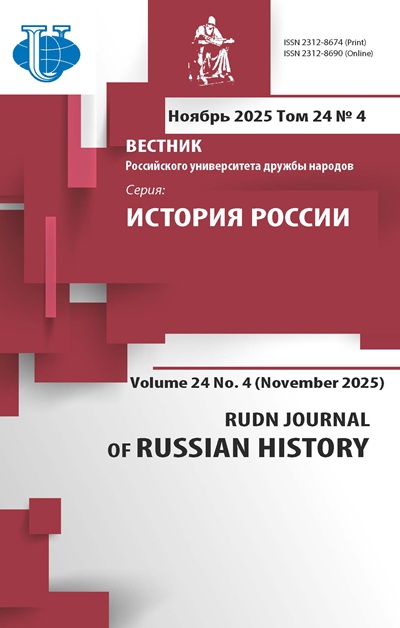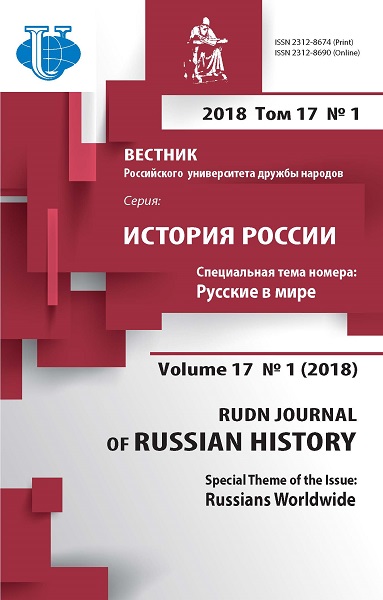Gustav Ewers’ contribution to the study of the initial period of Ancient Rus’ history
- Authors: Fomin V.V1, Isakova L.V2
-
Affiliations:
- Lipetsk State Pedagogical University named after P.P. Semenov-Tyan-Shan
- Lobachevsky State University of Nizhni Novgorod, Arzamas Branch
- Issue: Vol 17, No 1 (2018): RUSSIANS WORLDWIDE
- Pages: 151-174
- Section: ARTICLES
- URL: https://journals.rudn.ru/russian-history/article/view/18535
- DOI: https://doi.org/10.22363/2312-8674-2018-17-1-151-174
- ID: 18535
Cite item
Full text / tables, figures
Abstract
The authors analyze the views of G. Ewers (1871-1830) on the history and the law of Ancient Rus’. Ewers’ main achievement is the criticism of the Norman theory. The article includes the characteristics of the following arguments: the inconsistency of the Swedish etymology of the word «Rus’»; the fallacy of the origination of the ancient Russian law out of the Scandinavian law. The basis of Ewers’ concept is the patrimonial theory. It reveals the natural course of the emergence of a state of Eastern Slavs. The scientist formulated the Khazar theory instead of the Norman theory. Ewers attributed the origin of Rus’ to the Northern Black Sea region. He believed that a large role in the formation of the Pontic Rus’ was played by the Khazar ethnos. Ewers also made a significant contribution to the study of the Russian Chronicles. He denounced Schloezer’s methodology, demonstrated the composite character of the Russian Chronicles. The authors show that Ewers’ ideas were highly appreciated by his contemporaries. Ewers’ criticism meant the end of the first wave of normanism. His insights remain important for the contemporary historiography against the background of the attempts of the resurgence of normanism.
Keywords
About the authors
Vyacheslav V Fomin
Lipetsk State Pedagogical University named after P.P. Semenov-Tyan-Shan
Author for correspondence.
Email: vfominv@mail.ru
доктор исторических наук (Институт российской истории РАН, 2005), профессор кафедры отечественной и всеобщей истории Липецкого государственного педагогического университета имени П.П. Семенова-Тян-Шанского
42 Lenina St., Lipetsk, 398020 RussiaLubov V Isakova
Lobachevsky State University of Nizhni Novgorod, Arzamas Branch
Email: isakowa88@yandex.ru
выпускница исторического факультета Арзамасского государственного педагогического института имени А.П. Гайдара (2010), юридического факультета Института бизнеса и политики (г. Москва, 2011). Магистр направления подготовки «Психолого-педагогическое образование» (г. Нижний Новгород, 2013).
36 K. Marx St., Arzamas, Nizhniy Novgorod region, 607220 RussiaReferences
- Baier, G.Z. “O varyagakh.” [About the Varangians]. In Fomin, V.V. Lomonosov: Genii russkoi istorii, 344−361. Moscow: Russkaya panorama, 2006 (in Russian).
- Bestuzhev-Ryumin, K.N. Russkaya istoriya. Vol. 1. St. Petersburg: tipografiya A. Transhelya, 1872 (in Russian).
- Brusilov, N. “Istoricheskoe rassuzhdenie o nachale russkogo gosudarstva.” [Historical reasoning about the beginning of the Russian state]. Vestnik Evropy, no. 4 (1811): 285−306 (in Russian).
- Evers, I.F.G. Drevneishee russkoe pravo v istoricheskom ego raskrytii. Vol. 22. St. Petersburg, 1835 (in Russian).
- Ewers, G. Geschichte der Russen. Von den ältesten Zeiten bis zur Alleinherr-schaft Peters des Grossen. Dorpat, 1816.
- Ewers, G. “Über die Quelle der Jaroslawischen Prawda.” Mitauschen N. Wöch. Untern no. 1 (1808): 132−135.
- Ewers, G. Unangenehme Erinnerung an August Ludwig Schlözer. Dorpat: M.G. Grenzius, 1810.
- Ewers, G. Vom Ursprunge des russischen Staats. Ein Versuch, die Geschichte desselben aus den Quellen zu erforschen. Riga and Leipzig, 1808.
- Fedotov, A.F. O glavneishikh trudakh po chasti kriticheskoi russkoi istorii [About the most important works on critical Russian history]. Moscow, 1839 (in Russian).
- Fomin, V.V. “Fal’sifikatsii sovremennogo normanizma.” [Falsification of modern normality] In Rossiiskaya go-sudarstvennost’ v litsakh i sud’bakh ee sozidatelei, 265−283. Lipetsk: LGPU, 2013 (in Russian).
- Fomin, V.V. Nachal’naya istoriya Rusi. Uchebnoe posobie. Moscow: Russkaya panorama, 2008 (in Russian).
- Gadlo, A.V. “Problema Priazovskoi Rusi kak tema russkoi istoriografii (Istoriya idei).” [The problem of Priazovsky Russia as a theme of Russian historiography (History of ideas)] Sbornik Russkogo istoricheskogo obshchestva, no. 4 (2002): 14−39 (in Russian).
- Gedeonov, S.A. Varyagi i Rus’. Vol. 1, 2nd ed. Moscow: Russkaya panorama, 2004 (in Russian).
- Ger’e, V.I. Leibnits i ego vek. Otnosheniya Leibnitsa k Rossii i Petru Velikomu po neizdannym bumagam Leibnitsa v Gannoverskoi biblioteke. St. Petersburg, 1871 (in Russian).
- Iordan. O proiskhozhdenii i deyaniyakh getov (Getica). St. Petersburg: Aleteiya, 1997 (in Russian).
- Karamzin, N.M. Istoriya gosudarstva Rossiiskogo. Vol. 1. Moscow: Nauka, 1989 (in Russian).
- Karpov, S.P. “O varyagakh, yubileyakh i nashem obrazovanii.” [About Varangians, Jubilees and Our Education]. Rodina, no. 9 (2012): 6−10 (in Russian).
- Klein, L.S. Spor o varyagakh. Istoriya protivostoyaniya i argumenty storon. St. Petersburg: Evraziya, 2009 (in Russian).
- Klyuchevskii, V.O. “I.N. Boltin.” In Sochineniya v vos’mi tomakh, 130−163. Vol. 8. Moscow: Nauka, 1959 (in Russian).
- Latvakangas, A. Riksgrundarna. Varjagproblemet i Sverige frеn runinskrifter till enhetlig historisk tolkning. Turku, 1995
- Lelevel’, I. “Rassmotrenie Istorii gosudarstva rossiiskogo Karamzina.” [Consideration of the History of the Russian Karamzin State]. Severnyi arkhiv 9, no. 3 (1824): 163−170; 11, no. 15 (1824): 138−140; 12, no. 19 (1824): 50−51 (in Russian).
- Lomonosov, M.V. Polnoe sobranie sochineniy. Vol. 6, 2nd ed. Moscow; St. Petersburg, 2011 (in Russian).
- Leppik, L. Rektor Ewers. Tartu: Eesti Ajalooarhiv, 2001.
- Machinskii, D.A. “Nekotorye predposylki, dvizhushchie sily i istoriche-skii kontekst slozheniya russkogo gosudarstva v seredine VIII – seredine XI v.” [Some prerequisites, driving forces and historical context of the addition of the Russian state in the middle of the 8th − the mid-11th] In Slozhenie russkoi gosudarst-vennosti v kontekste rannesrednevekovoi istorii Starogo Sveta, 460−538. Vol. 49 of Trudy Gosudarstvennogo Ermitazha. St. Petersburg: Izdatelstvo Gosudarstvennogo Ermitazha, 2009 (in Russian).
- Mankiev, A.I. Yadro rossiiskoi istorii. St. Petersburg, 1791 (in Russian).
- Mel‘nikova, E.A. “Varyazhskaya dolya.”. Rodina, no. 11−12 (2002): 30−32 (in Russian).
- Moshin, V.A. “Varyago-russkii vopros.” [The Varyag-Russian question]. In Varyago-russkii vopros v istoriografii, 11−102. Moscow: Russkaya panorama, 2010 (in Russian).
- Naumova, G.R., Shiklo, A.E. Istoriografiya istorii Rossii. 2nd ed. Moscow: Akademiya, 2009 (in Russian).
- O zhilishchakh drevneishikh russov. Sochinenie g-na N. i kriticheskii razbor onogo. Translated by M.P. Pogodin. Moscow: Tipografiya S. Selivanovskogo, 1826 (in Russian).
- Pashkov, S.V. “Otnoshenie normanista M.P. Pogodina k trudam antinormanistov.” [The ratio of the Normanist M.P. Pogodin to the works of antinormanists] Voprosy istorii, no. 7 (2015): 147−154 (in Russian).
- Pashkov, S.V. “Razbor normanistom M.P. Pogodinym vzglyadov antinormanista I.F.G. Eversa na varyago-russkii vopros.” [Analysis of the Norman MP. Pogodin views of the antinormanist IFG. Evers on the Varangian-Russian question] Aktual’nye voprosy gumanitarnykh nauk: teoriya, metodika, praktika, 160−169. Issue 2. Moscow: MANPO, 2015 (in Russian).
- Pogodin, M.P. “G. Gedeonov i ego sistema o proiskhozhdenii varyagov i rusi.” [G. Gedeonov and his system on the origin of the Varangians and Rus]. In Skandinavomaniya i ee nebylitsy o russkoi istorii, 175−237. Moscow: Russkaya panorama; 2015 (in Russian).
- Pogodin, M.P. Issledovaniya, zamechaniya i lektsii o russkoi istorii. Normanskii period. Vol. 3. Moscow, 1846 (in Russian).
- Pogodin, M.P. “Moe predstavlenie istoriografu.” [Moe predstavlenie istoriografu] Russkii arkhiv, no. 11−12 (1866): 1766−1770 (in Russian).
- Predvaritel’nye kriticheskie issledovaniya Gustava Eversa dlya Rossiiskoi istorii. Translated by M. Pogodin. 1−2 books. Moscow: Moskovskoe obshchestvo lyubitelei istorii i drevnostei rossiiskikh: 1826 (in Russian).
- Priselkov, M.D. Istoriya russkogo letopisaniya XI–XV vv. St. Petersburg: Dmitrii Bulanin, 1996 (in Russian).
- Rozenkampf, G. “Ob’’yasnenie nekotorykh mest v Nestorovoi letopisi v ras-suzhdenii voprosa o proiskhozhdenii drevnikh russov.” [An explanation of some places in the Nestorovo chronicle in the discussion of the origin of the ancient Rus], 139−166. Bk. 1, part 4 of Chteniya v obshchestve istorii i drevnostei rossiiskikh. Moscow, 1839 (in Russian).
- Savel’ev-Rostislavich, N.V. “Varyazhskaya Rus’ po Nestoru i chuzhezemnym pisatelyam.” [Varangian Rus according to Nestor and foreign writers] In Zhurnal ministerstva narodnogo prosveshcheniya, part 48 (1845): 1−64 (in Russian).
- Sazonov, N. “Ob istoricheskikh trudakh i zaslugakh Millera.” [About the historical works and merits of Miller] Uchenye zapiski imperatorskogo Moskovskogo universiteta, no. 2 (1835): диапазон страниц (in Russian).
- Schlözer, A.L. Nestor. Russische Annalen in ihrer Slavonischen Grundsprache: verglichen, von Schreib Felern und Interpolationen möglich gereinigt, erklärt, und übersetzt. Vol. 5. Göttingen: von Vandenhoek und Ruprecht, 1809.
- Scholz, B. “Von der Chronistik zur modernen Geschichtswissenschaft. Die Warägerfrage in der russischen, deutschen und schwedischen Historiographie.” Veröffentlichungen des Osteuropa-Instituts München. Reihe Forschungen zum Ostseeraum. Bd. 5. Wiesbaden: Harrassowitz, 2000.
- Scholz, B. “Russische Geschichte an der Petersburger Akademie der Wissenschaften in der ersten Hälfte des 18. Jahrhunderts.” Lehmann-Carli G., Schippan M., Scholz B. & Brohm S. (Hrsg.). Russische Aufklärungs-Rezeption im Kontext offizieller Bildungskonzepte. Berlin, 2001.
- Senkovskii, O.I. “O proiskhozhdenii imeni russov.” [On the origin of the name of the Russians] In Sobranie sochinenii Senkovskago (barona Brambeusa), 149−168. Vol. 6. St. Petersburg, 1859 (in Russian).
- Shchavelev, S.P. 1150: yubilei rossiiskoi gosudarstvennosti. Kursk, 2012 (in Russian).
- Shevtsov V.I. “Gustav Evers i ego mesto v russkoi istoriografii.” [Gustav Evers and his place in Russian historiography] PhD thesis, Dnepropetrovskii gosudarstvennyi universitet, 1970 (in Russian).
- Shevtsov V.I. “G. Evers i razvitie russkoi istoricheskoi nauki v XVIII – nachale XIX v. v nemetskoi istoriografii.” [G. Evers and the development of Russian historical science in the XVII − early XX century. in German historiography] In Issledovaniya po germano-slavyanskim otnosheniyam, 30−42. Moscow: Nauka, 1971 (in Russian).
- Shevtsov V.I. “Gustav Evers i russkaya istoriografiya.” [Gustav Evers and Russian historiography] Voprosy istorii, no. 3 (1975): 55−70 (in Russian).
- Shevtsov V.I. “Voprosy istorii russkogo prava v osveshchenii G. Eversa.” [Questions of the history of Russian law in the coverage of G. Evers] Pravovye idei i gosudarstvennye uchrezhdeniya (istoriko-yuridicheskie issledovaniya). 70−84. Sverdlovsk: UrGU, 1980 (in Russian).
- Schevzov, W.I. “Die Sippentheorie bei Gustav Ewers. ” In Russisch-deutsche Beziehungen von der Kiewer Rus΄ bis zur Oktoberrevolution, 163−180. Berlin, 1976.
- Shiklo A.E. “Kriticheskoe napravlenie v otechestvennoi istoriografii 20-40-kh gg. XIX v. I.F.G. Evers. N.A. Polevoi. M.T. Kachenovskii.” [Critical direction in the domestic historiography of the 20−40-ies. XIX century. I.P.G. Evers. ON. Field. M.T. Kachenovsky] In Istoriografiya Rossii do 1917 g., 222−231. Vol. 1. Moscow: Izdatel’skii tsentr VLADOS, 2003 (in Russian).
- Shiklo, A.E. “On zastavil dumat’ nad russkoyu istorieyu: Iogann Filipp Gustav Evers.” [He forced to think over Russian history: Johann Philippe Gustav Evers] Istoriki Rossii XVIII – nach. XX vv., 124−136. Moscow: Skriptorii, 1996.
- Shletser, A.L. “Nestor.” Russkie letopisi na drevleslavyanskom yazyke, sli-chennye, perevedennye i ob”yasnennye A.L. Shletserom. Vol. 1. St. Petersburg: V Imperatorskoi tipografii, 1809 (in Russian).
- Shletser, A.L. “Opyt izucheniya russkikh letopisei.” [The experience of studying Russian chronicles] Skandinavomaniya i ee nebylitsy o russkoi istorii, 26−81. Moscow: Russkaya panorama, 2015 (in Russian).
- Shtrube de Pirmont, F.G. Rassuzhdeniya o drevnikh rossiyanakh. Moscow, 1791 (in Russian). Skrynnikov, R.G. Rus’ IX–XVII veka. St. Petersburg: Piter, 1999 (in Russian).
- Sokolov, S.V. Kontseptsii proiskhozhdeniya «varyazhskoi rusi» v otechestvennoi istoriografii XVIII–XIX vv. v kontekste evropeiskikh idei rannego novogo vremeni. Ekaterenburg: Bank kul’turnoi informatsii, 2015 (in Russian).
- Solov’ev, S.M. Istoriya Rossii s drevneishikh vremen. Bk. 1, vol 1−2. Moscow: Golos, 1993 (in Russian).
- Solov’ev, S.M. Istoriya Rossii s drevneishikh vremen. Bk. 7, vol. 13−14. Moscow: Golos, 1997 (in Russian).
- Sreznevskii, II. Mysli ob istorii russkogo yazyka. St. Petersburg, 1850 (in Russian). Tatishchev, V.N. Istoriya Rossiiskaya s samykh drevneishikh vremen. Vol. 1. Moscow; Le-
- ningrad: Nauka, 1962 (in Russian).
- Umbrashko, K.B. “Istorizm v russkoi istoriografii pervoi poloviny XIX veka.” [Historism in Russian Historiography of the First Half of the 19th Century] Interekspo Geo-Sibir’ 6 (2011): 266−270 (in Russia).
- Umbrashko, K.B. “Filosofsko-metodologicheskie poiski evropeiskikh i russkikh istorikov XVIII – pervoi poloviny XIX vv.” [Philosophical and methodological searches of European and Russian historians of the 18th − first half of the 19th] Filosofiya obrazovaniya 38, no. 5 (2011): 99−100 (in Russian).
- Vashchenko, E.D. “Khazarskaya problema” v otechestvennoi istoriografii XVIII–XX vv. St. Petersburg, 2006 (in Russian).
- Vladimirskii-Budanov, M.F. Obzor istorii russkogo prava. Petrograd; Kiev: Tipografiya Ogloblina, 1915 (in Russian).
- Voigt, G. Russland in der deutschen Geschichtsschreibung 1843–1945. Berlin, 1994. Zelenov, M.V. “Iogann Filipp Gustav Evers.” In Istoriki Rossii XVIII–XX vv. [Historians of Russia of the 18th – 20th centuries], 81−85. Issue 1. Moscow: Arkhivno-informatsionnoe agentstvo, 1995 (in Russian).
- Voigt, G. “Iogann Filipp Gustav Evers.” Istoriki Rossii: biografii, 116−121. Moscow: Rossiiskaya politicheskaya entsiklopediya, 2001 (in Russian).
- Zeil, W. Slawistik in Deutschland. Böhlau, 1994.
Supplementary files















